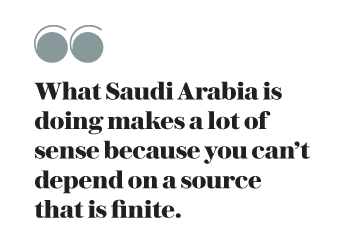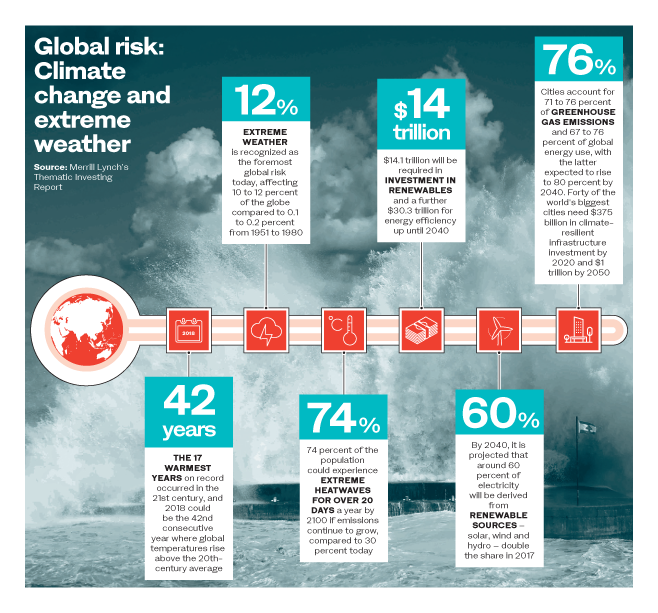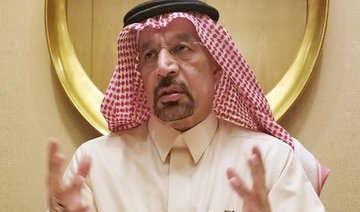DUBAI: With climate change perceived as the most pressing risk for the world today, government officials and energy experts are emphasizing the importance of shifting toward a global green economy.
According to the Bank of America Merrill Lynch’s Thematic Investing report, the 17 warmest years on record occurred in the 21st century, and 2018 could be the 42nd consecutive year where global temperatures rise above the 20th-century average.
This year’s Intergovernmental Panel on Climate Change also warned that we are currently heading toward a 3C rise in temperature, with the 1.5C barrier potentially breached in 12 years, by 2030.
As extreme weather is recognized as the foremost global risk today, affecting 10 to 12 percent of the globe compared to 0.1 to 0.2 percent from 1951 to 1980, the frequency and severity of heatwaves, hurricanes, floods and droughts are intensifying. But green capital, digital transformation and social engagement can play a fundamental role in nations helping fight the cause by transitioning to a green economy.
Regionally, countries such as Saudi Arabia and the UAE are leading the movement with a number of initiatives in renewable energy and energy efficiency.
“What Saudi Arabia is doing by moving away from petroleum makes a lot of sense, because you have to maintain and change the economy’s base as you can’t depend on a source that is finite,” said Dr. Jorge Chediek, director at the UN Office for South-South Cooperation, who’s also the envoy of the secretary general on the topic.
“It’s finite for geological reasons and because there are technologies that are starting to (emerge). You can see on the horizon that, in some number of years, the commodity will become less valuable and, at the same time, you need to do it to broaden the base of the economy, so the reforms that are currently taking place make complete sense.”
As countries around the world prepare to decarbonize their economy, others, such as the US and potentially Brazil, were criticized at last month’s World Green Economy Summit in Dubai for pulling out of the Paris Agreement. Established within the United Nations Framework Convention on Climate Change (UNFCC), the agreement deals with the mitigation of greenhouse gas emissions, adaptation and finance, starting in 2020. The UNFCC will gather its parties during its next conference, COP24, in Poland in December.
“In international politics, we have a bifurcated reality,” said Christina Figueres, former secretary general at the UN Framework Convention on Climate Change. “We have the reality that science has dictated and another reality. The current position of the US federal government has made it quite difficult for other countries to come together and collaborate at the international political level. So, it’s no surprise that the two major developing countries, China and India, are having a very hard time continuing to negotiate under the Paris Agreement.”
She said, however, that this difficult international political reality is in stark contrast to the real economic reality, which is one that is in absolute and incontrovertible decarbonization. “China has already met the targets that they promised under the agreement, and India is really ahead,” she added. “You have a very different reality. All this will mean more food security, water security, more liveable cities, better transport and energy independence, cleaner air and less pollution.”
Renewables and energy efficiency have the potential to move the world more than 80 percent of the way toward a safe 2C warming scenario by reducing Co2 emissions by 40 percent to 2040. “We need to transform and go through this energy transition,” said former French president Francois Hollande at the World Green Economic Summit last month. “I trust today that all financial institutions have finally accepted the green economy within their strategies, but I cannot hide my worries: We need to know what the US’ behavior will be in the medium term.”
He spoke of an undisputable acceleration of the planet’s degradation that has the potential to shake up the entire globe. “My worry is that, despite the efforts by all participating countries, we have seen more Co2 emissions in 2017 than in 2016,” he added. “What I see today is we have a lot of doubts when it comes to the performance of investments in the green economy.”
He called it a threat to our planet, which will require, in the coming years, a stronger concerted effort to achieve all the commitments in the agreement.
According to the Thematic Investing report, 74 percent of the population could experience extreme heatwaves for more than 20 days a year by 2100 if emissions continue to grow, compared to 30 percent today. Even in a scenario with declining emissions, 48 percent of people will still be affected. As such, a strategy for decarbonization is urgently needed.
“To reach this level, we need to agree on a carbon price on a global level, but also in every single country,” Hollande said. “The price of carbon will provide to all economic actors in the world a possibility to reach, on the short and long term, a sign of economic growth and investments. Measures need to be taken for this, while using emerging technologies, such as artificial intelligence.”
The report notes that $14.1 trillion will be required in investment in renewables and a further $30.3 trillion for energy efficiency up until 2040. But the world’s three largest greenhouse gas emitters — China, the US and Europe — are all making major strides and it is estimated that, by 2040, the world’s electricity intensity is projected to fall by 25 percent and carbon intensity by 58 percent.
Disruptive technologies are also transforming every sector, including climate mitigation, where tech-enabled tools, such as smart grids, forest monitoring and data-driven energy reductions are expected to help to solve climate challenges more effectively at a previously unseen pace.
“The green economy is becoming more and more important every day,” said Dr. Thani Al-Zeyoudi, UAE Minister of Climate Change and Environment. “It is the only way in which we will be able to do business in a more sustainable manner. In many cases, it might not be available due to a lack of technology, but innovative solutions can lead this change.”
The digitalization of energy is an element that would have been impossible last century. “We can increase efficiency with which we produce and use energy,” Figueres said. “We’re applying AI thanks to digitalization, which takes the optimization of energy production, use and distribution to new levels. This is a complete energy revolution, the likes of which we’ve never seen in the history of humankind, and it’s all possible only because of technology and knowledge.”
Renewable energy is increasingly being perceived as an economically feasible alternative. Wind and solar are at, or at better than, grid parity in most regions globally and uptake of energy storage is needed to make renewables viable. “There are 40 jurisdictions around the world in which solar is cheaper than coal, including India and the UAE,” she added. “The next step is storage, which needs to be invested in to make a combination of renewables with storage the cheapest source of energy. We still have 1.3 billion people unelectrified on the planet, which is completely unacceptable and, through fossil fuels, it’s not possible to reach them, but with solar panels, we can go anywhere on the face of the earth.”















